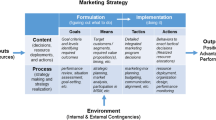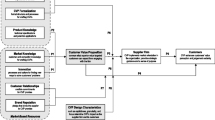Abstract
International marketing practices, embedded in a strong ethical doctrine, can play a vital role in raising the standards of business conduct worldwide, while in no way compromising the quality of services or products offered to customers, or surrendering the profit margins of businesses. Adherence to such ethical practices can help to elevate the standards of behavior and thus of living, of traders and consumers alike. Against this background, this paper endeavors to identify the salient features of the Islamic framework of International Marketing Ethics. In particular, it highlights the capabilities and strengths of this framework in creating and sustaining a strong ethical international marketing culture. At the heart of Islamic marketing is the principle of value-maximization based on equity and justice (constituting just dealing and fair play) for the wider welfare of the society. Selected key international marketing issues are examined from an Islamic perspective which, it is argued, if adhered to, can help to create a value-loaded global ethical marketing framework for MNCs in general, and establish harmony and meaningful cooperation between international marketers and Muslim target markets in particular.
Similar content being viewed by others
References
Abu-Sulayman, Abdul-Hamid Ahmad: 1976, ‘The Theory of Economics’, Contemporary Aspects of Economic Thinking in Islam (American Trust Publications, Plainfield).
Ahmad, M.: 1995, Business Ethics In Islam (IIIT, Pakistan, Islamabad).
Al-Faruqi, Ismail Raji: 1992, AL TAWHID: Its Implications for Thought and Life (IIIT, Kuala Lumpur).
Al-Razi, Muhammad: 1985, Tafsir Fakhru-ar-Razi, 3rd edition (Darul Fikr, Beirut).
Al-Ukhuwa, Diya'al-Din Muhammad Ibn: 1983, The ma'alim al-Qurba fi Ahkam al-Hisbah, by Reuben Levy ed. (Luzak, London).
Al-Qur'an (107: 1–7), (13:17), (21:23), (102:8), (2:188), (23:7), (24:33), (9:53–54), (11:15), (72:13), (2:282), (7:85), (11:85), (26:183), (83:1–3), (23:51), (6:114–115), (2:167–168), (102:8), (100:8), (3:14), (43:19,80), (33:19, 58), (58:17–19), (83:26), (2:172,7), (7:160), (20:81), (2:168), (5:88), (8:69), (16:114), (23:51), (5:4), (5:5), (7:157). For an English translation of the Qur'an, the reader should refer to The Meaning of the Glorious Qur'an by Abdullah Yusuf Ali, Nadim & Co., Ta'ha Publishers Ltd., 68A Delaney St., London NW1 7RY.
Adler, P. S. and B. Borys: 1993, ‘Materialism and Idealism in Organizational Research’, Organization Studies 14(5), 657–679.
Almeder R.: 1983, ‘Morality in the Marketplace’, in Milton Snoeyenbos, Robert Almeder and James Humber (eds.), Business Ethics (Prometheus Books, New York).
Al-Misri, Ahmad Ibn Naqub: 1991, The Reminiscences of the Traveler: A Classical Manual of Islamic Sacred Law, trans. by Noah Ha Mim Keller (Modern Printing Press, Abu Dhabi).
An-Nawawi, Imam, Riyadhul-Us-Saleheen, trans., S. M. M. Abasi, Riyadh: IIPH, N.Y, 1:149. Narrated by Muslim.
Armstrong, R.W.: 1992, ‘An Empirical Investigation of International Marketing Ethics: Problems Encountered by Australian Firms’, Journal of Business Ethics 11, 161–171.
Barnett, T., K. Bass and G. Brown: 1994, ‘Ethical Ideaology and Ethical Judgement Regarding Ethical Issues in Business’, Journal of Business Ethics 13(6) (June), 469–480.
Barry, V. and W. H. Shaw: 1992, Moral Issues in Business (Wadworth Publishing Company, Belmont).
Bayles, M (ed.): 1968, Contemporary Utilitarianism (Anchor Books, New York).
Beekun, R.A.: 1981, Islamic Business Ethics, The Islamic Institute of Islamic Thought, Human Development Series 2.
Bovee, C. L. and J.V. Thill: 1992, Marketing (McGraw-Hill, Inc., New York).
Brenner, S. N. and E. A. Molander: 1977, ‘Is the Ethics of Business Changing?’, Harvard Business Review 55(1) (Jan/Feb), 57–71.
Cateora, P. R.: 1996, International Marketing (Irwin, Chicago).
Cavanagh, G. H., D. J. Moberg and M. Velasquez: 1995, ‘Making Business Ethics Practical’, Business Ethics Quarterly 5(3), 399–418.
Choudhury, Masudul Alam: 1996, ‘Toward the Islamic Political Economy at the Turn of the Century’, The American Journal of Islamic Social Sciences 13(3) (IIIT, Herneden), p. 367.
De Balder, R. T., T. Richard and M. H. Khan: 1993, ‘The Changing Face of Islamic Banking’, International Financial Law Review 12(11) (Nov), 23–26.
Donaldson, J.: 1989, Key Issues in Business Ethics (Academic Press, London).
Dubinsky, A. J., M. A. Jolson, M. Kotabe and Un Lim Chae: 1991, ‘A Cross-National Investigation of Industrial Salespeople's Ethical Perceptions’, Journal of International Studies 22 (Winter), 651–670.
Erffmeyer, R. C., J. A. Al-Khatib, M. I. Al-Habib and J. F. Hair, Jr.: 1993, ‘Sales Training Practices: A Cross-National Comaprison’, International Marketing Review 10(1), 45–59.
Fraedrich, John Paul: 1993, ‘The Ethical Behavior of Retail Managers’, Journal of Business Ethics 12(3) (Mar), 207–218.
Forsyth, S. J.: 1980, ‘A Taxonomy of Ethical Ideologies’, Journal of Personality and Social Psychology 39(1), 175–184.
Forune 500: 1977, Social Responsibility Disclosure, Annual Reports (Ernt & Ernst, Cleveland, Ohio).
Fulmer, R. M.: 1978, The New Management, Second Edition (The Macmillan Co., New York).
Gaertner, W.: 1994, ‘Distributive Justice: Theoretical Foundations and Empirical Findings’, European Economic Review 38(3, 4) (Apr), 711–720.
Green, R. M.: 1993, ‘Centesimus Annus: A Critical Jewish Perspective’, Journal of Business Ethics 12, 945–954.
Gould, S. J.: 1995, ‘The Buddhist Perspective on Business Ethics: Experiential Exercises for Exploration and Practices’, Journal of Business Ethics 14, 63–70.
Hartley, R. F.: 1993, Business Ethics: Violations of the Public Trust (John Wiley & Sons, Inc., New York).
Helms, M. M. and B. A. Hutchins: 1992, ‘Poor Quality Products: Is Their Production Unethical?’, Management Decision 30(5), 35–46.
Haq, Irfan Ul: 1995, Economic Doctrines of Islam (IIIT, Herndon).
Hollingsworth, J. A., E. H. Hall, Jr. and J. Robert: 1991, ‘Trinkaus Utilitarianism: An Ethical Framework for Compensation Decision Making’, Review of Business 13(3) (Winter 1991/1992), 17–21.
Hunt, S. D.: 1994, ‘On Rethinking Marketing: Our Disciplines, Our Practice, Our Methods’, European Journal of Marketing 28(3), 13–25.
Husted, B. W.: 1996, ‘The Impact of Cross-National Carriers of Business Ethics on Attitudes about Questionable Practices and the Form of Moral Reasoning’, Journal of International Business Studies 27(2), 392.
Ibn Taymiya, Al-Shaykah al-Imam: 1982, Public Duties in Islam: The Institution of the Hisba, trans. by Muhtar Holland (The Islamic Foundation, Wiltshire).
Isfha-n, Abu Qassim: Mufrada-tu fiy Ghariybil al-Qur'an (Darul Ma'arifa, Beirut).
Jayasankaran S.: 1996, ‘Winning Streak’, Far Eastern Economic Review 160(1), 78–180.
Laurence, B.: 1995, ‘Do Corporations Institutionalize Dishonesty’, in Ethics: The Enemy in the Work Place (International Thomson Publishing Company, Ohio).
Levitt T.: 1983, ‘The Cultural Diversity of Western Conceptions of Management’, International Studies of Management and Organsition 13(1–2), 75–96.
Maclntyre, A.: 1981, After Virtue ( University of Notredame).
Malik Ibn Anas: 1989, Al-Muttawa of Imama Malik bin Anas-The First Formulation of Islamic Law, Translated by Bewley Aisha (Kegan Paul International, London).
Martin J.: 1997, ‘Islamic Banking Raises Interest’, Management Review 86 (November), 25–29.
Mayer, D. and A. Cava: 1993, ‘Ethics and the Gender Equality Dilemma for the U.S Multinationals’, Journal of Business Ethics 12(9) (Sep.), 701–708.
Miller, A. and G. G. Deiss: 1996, Strategic Management (The McGraw-Hill, Inc., New York).
Miskawayh Ibn, Ahmad Ibn Muhammad: 1968, The Refinement of Character, trans. by Constantine K. Zurayk (The American University of Beirut, Beirut).
Nadwi, Abul Hassan Ali: 1978, ‘The Most Suitable Religion for Mankind’, in Altaf Gauhar (ed.), The Challenge of Islam (Islamic Council of Europe, London).
Naughton, M. and G. R. Laczniak: 1993, ‘A Theological Context of Work From the Catholic Social Encyclical Tradition’, Journal of Business Ethics 12(12) (Dec.), 981–994.
Niazi, Liaquat Ali Khan: 1996, Islamic Law of Contract (Research Cell, Dyal Sing Trust Library, Lahore).
Peter, J. P.: 1992, ‘Realism or Relativism for Marketing Theory and Reasearch: A Comment on Hunt's “Scientific Realism”’, Journal of Marketing 56(2) (Apr), 72–79.
Razzouk, N. and J. Al-Khatib: 1993, ‘The Nature of Television Advertising in Saudi Arabia: Content Analysis and Marketing Implications’, Journal of International Consumer Marketing 6(2), 65–90.
Reidenbach, R. E., D. P. Robin and L. Dawson: 1991, ‘An Application and Extension of a Multidimensional Ethics Scale to Selected Marketing Practice’, Journal of Academy of Marketing Science 19, 83–92.
Rice, G.: 1999, ‘Islamic Ethics and the Implications for Business’, Journal of Business Ethics 18(4), 345–358.
Ralston, D. J., D. J. Gustafson, F. M. Cheung and R. H. Terpstra: 1993, ‘Differences in Managerial Values: A Study of U.S., Hong Kong and PRC Managers’, Journal of International Business Studies 24 (Summer), 249–275.
Rawls, J. A.: 1971, A Theory of Justice (Harvard University Press, Cambridge, MA).
Roberts, J. R.: 1979, ‘Will The Real Socially Responsible Consumer Please Step Forward’, Business Horizons (Jan-Feb).
Robin, D. P. and R.E. Reidenbach: 1987, ‘Social Responsibilty, Ethics and Marketing Strategy: Closing the Gap between Concept and Application’, Journal of Marketing (Jan), 44–58.
Robin, D. P. and R. E. Reidenbach: 1993, ‘Searching for a Place to Stand: Toward a Workable Ethical Philosophy in Marketing’, Journal of Public Policy & Marketing 12(1) (Spring), 97–105.
Rogers, H. P., A. O. Ogbuehi and C. M. Kochunny: 1995, ‘Ethics and Transnational Corporations in Developing Countries: A Social Contract Perspective’, in N. Delener (ed.), Ethical Issues on International Marketing (International Business Press, Binghamton, NY).
Rossauw, G. J.: 1994, ‘Business Ethics: Where Have All the Christians Gone?’, Journal of Business Ethics 13, 557–570.
Safi, L.: 1996, The Foundation of Knowledge A Comparative Study in Islamic and Western Methods of Inquiry (IIIT, Kuala Lumpur).
Schnall, D. J.: 1993, ‘Exploratory Notes on Employee Productivity and Accountability in Classic Jewish Sources’, Journal of Business Ethics 12(6) (Jun), 485–491.
Sahih al-Bukhari Shaw, W. H.: 1996, Business Ethics (Wadworth Publishing Company, Belmont).
Stark, A.: 1993, ‘What's the Matter with Business Ethics?’, Harvard Business Review 71, 38–48.
Tansey, R., G. Brown, M. R. Hyman and L. E. Dawson, Jr.: 1994, ‘Personal Moral Philosophes and the Moral Judgements of Salespeople’, Journal of Personal Selling and Sales Management 14(1), 59–75.
Treise, D., M. F. Weigold, J. Conna and H. Garrison: 1994, ‘Ethics in Advertising: Ideological Correlates of Consumer Percptions’, Journal of Advertising 23(3), 59–69.
Tuncalp, S. and O. Erdem: 1998, ‘Sales Promotion, Personal Selling, and Publicity: The Legal Environment in Saudi Arabia’, Journal of International Marketing & Marketing Research 23(1) (Feb), 35–46.
Tyser, C. R., D. G. Demetriades and I. H. Effendi: 1967 (translation from Turkish of Majallah-el Ahkam-i-Adliya). Majella: A Complete Code on Islamic Civil Law, trans. Lahore (Law Publishing Company, NY).
Vasquez-Parraga and A. Kara: 1995, ‘Ethical Decision Making in Turkish Sales Management’, in N. Delener (ed.), Ethical Issues on International Marketing (International Business Press, Binghamton, NY).
Werhame, P. H.: 1983, ‘Ethical Relativism and Multinational Corporations’, in Milton Snoeyenbos, Robert Almeder and James Humber (eds.), Business Ethics (Prometheus Books, New York).
Williams, O. F.: 1993, ‘Catholic Social Teaching: A Communitarian Democratic Caplitalism for the New World Order’, Journal of Business Ethics 12, 919–932.
Zaman, S. M. Hasanuz: 1981, Economic Functions of an Islamic State (Islamic Foundation, Karachi, Pakistan).
Author information
Authors and Affiliations
Rights and permissions
About this article
Cite this article
Saeed, M., Ahmed, Z.U. & Mukhtar, SM. International Marketing Ethics from an Islamic Perspective: A Value-Maximization Approach. Journal of Business Ethics 32, 127–142 (2001). https://doi.org/10.1023/A:1010718817155
Issue Date:
DOI: https://doi.org/10.1023/A:1010718817155




